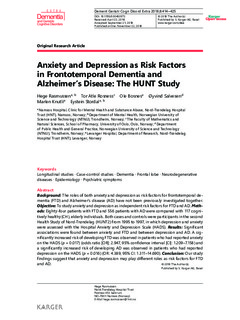Anxiety and Depression as Risk Factors in Frontotemporal Dementia and Alzheimers Disease: The HUNT Study
Eid, Hege Rasmussen; Rosness, Tor Atle; Bosnes, Ole; Salvesen, Øyvind; Knutli, Marlen; Stordal, Eystein
Journal article, Peer reviewed
Published version

Åpne
Permanent lenke
http://hdl.handle.net/11250/2586166Utgivelsesdato
2018Metadata
Vis full innførselSamlinger
Originalversjon
Dementia and geriatric cognitive disorders extra. 2018, (8), 414-425. 10.1159/000493973Sammendrag
Background: The roles of both anxiety and depression as risk factors for frontotemporal dementia (FTD) and Alzheimer’s disease (AD) have not been previously investigated together. Objective: To study anxiety and depression as independent risk factors for FTD and AD. Methods: Eighty-four patients with FTD and 556 patients with AD were compared with 117 cognitively healthy (CH), elderly individuals. Both cases and controls were participants in the second Health Study of Nord-Trøndelag (HUNT2) from 1995 to 1997, in which depression and anxiety were assessed with the Hospital Anxiety and Depression Scale (HADS). Results: Significant associations were found between anxiety and FTD and between depression and AD. A significantly increased risk of developing FTD was observed in patients who had reported anxiety on the HADS (p = 0.017) (odds ratio [OR]: 2.947, 95% confidence interval [CI]: 1.209–7.158) and a significantly increased risk of developing AD was observed in patients who had reported depression on the HADS (p = 0.016) (OR: 4.389, 95% CI: 1.311–14.690). Conclusion: Our study findings suggest that anxiety and depression may play different roles as risk factors for FTD and AD.
